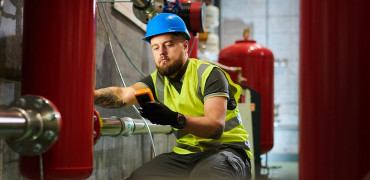Facilities managers are masters of all but still seen as a Cinderella service.
However, they should consider themselves the Conductors and understand their role is to lead the orchestra, not try and play every single instrument.
Facilities management (FM) encompasses a breathtaking array of services, from cleaning to office space planning and building safety and security to HVAC and energy management.
And now of course, they are also at the forefront of decarbonising the building.
It’s impressive that so much of the work of FMs goes on in backrooms or places that building occupants rarely see.
In fact, it’s a virtue if facilities tasks are carried out quickly and with minimal disruption to other work in a building.
This can lead to a more harmonious outcome for everyone.
Sustainability
An important development that has brought FM out of the backroom is sustainability.
As corporate clients put a new emphasis on carbon reduction strategies, they are looking to the facilities team to help identify areas where energy and carbon can be saved.
This could be along the supply chain in terms of consumables delivered to the building in the form of office supplies, for example. Additionally, the FM team may be tasked with optimising the energy performance across the whole building.
By embracing sustainability initiatives, facilities management has become integral to operations.
As part of this shift, FMs help optimise systems, reduce waste, and improve energy efficiency, leading to a better work environment and increased occupant satisfaction.
Taking the lead
But integrating all the tasks and strategies that fall under the broad heading of ‘FM’ is a challenge.
This is similar to a symphony orchestra, in which the conductor must bring together the many different instruments into an integrated, harmonious performance.
Every role within the FM team is essential and must be managed in conjunction with each other to achieve the desired outcomes.
In addition, the FM team must include a range of professionals that can focus their expertise where it’s most needed.
Sometimes that can best be achieved by bringing in external expertise, particularly where specialist certifications are required.
Indeed, it is essential to ensure that external experts are highly qualified and experienced in the specific skills necessary for the role.
One example is in the service and maintenance of air conditioning equipment.
Working with specialists means being sure that they have the right training and qualifications, for instance, that they are F Gas Certified to handle refrigerants.
Remote monitoring
Another aspect of finding expert input is to consider harnessing the power of technology through remote monitoring.
The gap between BIM modelling for design and construction and managing a ‘live’ building is shrinking as technology advances.
This means that remote monitoring is becoming far more accessible for a broader range of buildings.
And the impact on enhanced performance, including energy efficiency, for example, is significant.
If we take HVAC equipment as an example, remote monitoring is not simply a case of observing operations from an offsite location.
For example, today’s chillers can be monitored for optimised performance so that any change from that signals a potential fault.
As a result, an engineer can be on-site quickly to check the equipment – addressing the issue before it leads to a problem such as loss of heating or cooling for the building.
Harmonious outcomes
Working with a knowledgeable, reliable team of service and maintenance experts means the FM management team can focus on managing and delivering the overall facilities strategy.
However, given the broad responsibilities facing facilities professionals today, even the biggest team isn’t guaranteed expertise in areas such as chiller performance or F Gas regulations.
Rather than trying to play every instrument in the orchestra, working with experts allows facilities managers to take the lead and conduct the orchestra, leading to a more harmonious outcome for everyone.
Kevin Wilcott is Business Development Manager (Service & Maintenance)




